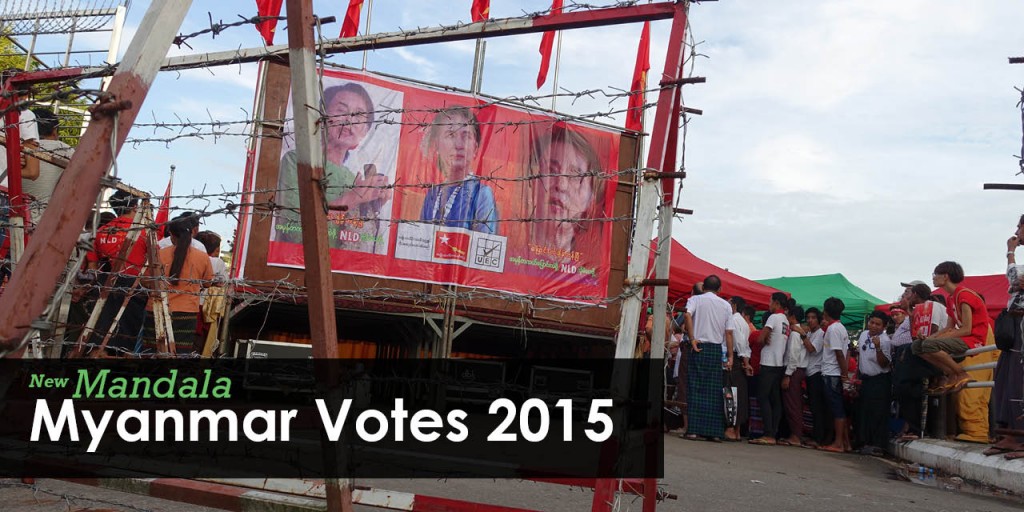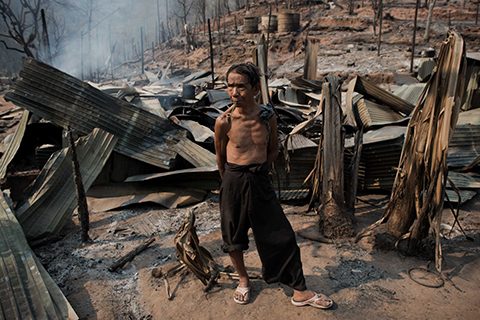
Ongoing race and religious tensions could damage the National League for Democracy’s prospects in this Sunday’s election.
The current term of government in Myanmar has been marked by the rise of Buddhist nationalism and religious tensions, which have occasionally spilled into communal violence.
While it is yet to be seen how this Sunday’s vote will influence the situation, the issue’s importance for the election has been widely acknowledged. In September, several foreign embassies in Yangon issued a joint statement urging political parties and other organisations to refrain from exploiting religion and ethnicity for electoral gain.
Prior to Aung San Suu Kyi’s 16-18 October campaign visit to southern Rakhine State, an influential nationalist Buddhist monk, U Eaindra Sar Ya, advised the opposition leader against the visit, citing concerns that her presence would inflame tensions.
Instances of communal violence have occurred in areas recently visited by monk-led Buddhist nationalist groups, including the “969” movement, and the more organised and politically influential Organisation for Protection of Race and Religion, or MaBaTha. Observers have noted a pattern of nationalist monks delivering anti-Islam speeches, before agitators, unfamiliar to locals, incite violence against local Muslims.
The relationship between MaBaTha and the government is as opaque as it is complicated. There has been speculation that hardliners from within the government have encouraged nationalist groups. At the very least, it is clear that the government has tolerated their hate speech.
President Thein Sein has defended MaBaTha leader U Wirathu publically, calling him a “son of Lord Buddha”. Furthermore, in 2014, the government adopted the controversial “Protection of Race and Religion” legislation package, which was first proposed by MaBaTha. The group lobbied hard for its passage, and the four bills were passed into law in 2015.
The laws are widely perceived to target Myanmar’s Muslim populations, particularly in northern Rakhine State. After pressure from Buddhist nationalists earlier this year, the President disenfranchised hundreds of thousands of Rohingya Muslims in northern Rakhine State, who the government refers to as “Bengalis”.
Although Islam has a long history in Myanmar, anti-Muslim sentiment has developed since the colonial period, as the British encouraged mass migration from the Indian subcontinent. Military governments since the 1962 coup treated Muslims with suspicion, and Buddhism became the de facto state religion. Today, estimates of the Muslim population lie between four and 13 per cent, while Buddhists are though to make up approximately 80 per cent.
Violence has the effect of constructing divisions in more rigid ways, thus strengthening communal identities. While the campaign period has been peaceful, the ongoing tensions are expected to damage the National League for Democracy’s prospects in the election. A siege mentality among Buddhists, encouraged by nationalist groups, has contributed to the general opinion that the NLD is weak on protecting Buddhism.
Aung San Suu Kyi herself has said little on the subject of communal violence, leaving concerned Buddhists wondering where she stands. MaBaTha have also become directly involved in politics, encouraging supporters to vote for the incumbent government over the NLD.
One example of communal violence affecting the NLD’s electoral prospects is the case of Meiktila. The local member, NLD parliamentarian U Win Htein, witnessed the communal violence there in March 2013, and attempted to stop the crowd attacking Muslims. Instead, the rioters threatened to turn on him. After U Win Htein publically denounced the riots, his constituents petitioned for his removal.
Despite warnings, Aung San Suu Kyi’s southern Rakhine State rallies were jubilant affairs, and well attended by both Buddhist and Muslim populations. One of three Rakhine campaign stops that the NLD leader made was Thandwe, the scene of anti-Muslim riots in 2013.
There, activists from the Muslim Kaman minority, a group targeted by violence, told me that Rakhine Muslims remain strong supporters of the NLD. While they are disappointed at the party’s decision not to field any Muslim candidates, they attribute this decision to pressure from MaBaTha, rather than the NLD’s own preference.
Residents say the situation between religious communities is markedly better now, following interfaith dialogue and interventions from influential monks. Ongoing tensions and insecurities remain clear, nonetheless. Furthermore, the Buddhist ethno-nationalist Arakan National Party is still expected to sweep the state legislature, and win a number of seats nationally. Some leaders of the ANP have been implicated in the strife that has inflicted the state since 2012.
At the rally in Thandwe, an elderly Rakhine Muslim woman explained to me that she is very frightened for a future under an ANP government elected by the majority Rakhine. Meanwhile, on the podium, Aung San Suu Kyi was asked a question formulated from fears of a Muslim takeover under the NLD. She assured the crowd that a democratic government cannot do anything without the people’s wishes, a sentiment unlikely to ease the anxieties of Myanmar’s religious minorities.
James T Davies is a PhD candidate at the University of New South Wales, Canberra. He is currently undertaking fieldwork in Myanmar.
This article forms part of New Mandala’s ‘Myanmar and the vote‘ series.
 Facebook
Facebook  Twitter
Twitter  Soundcloud
Soundcloud  Youtube
Youtube  Rss
Rss 